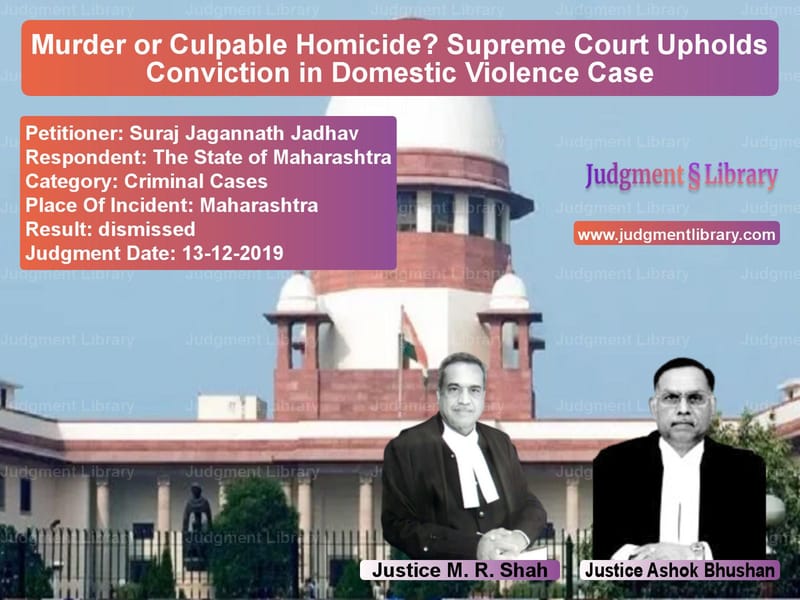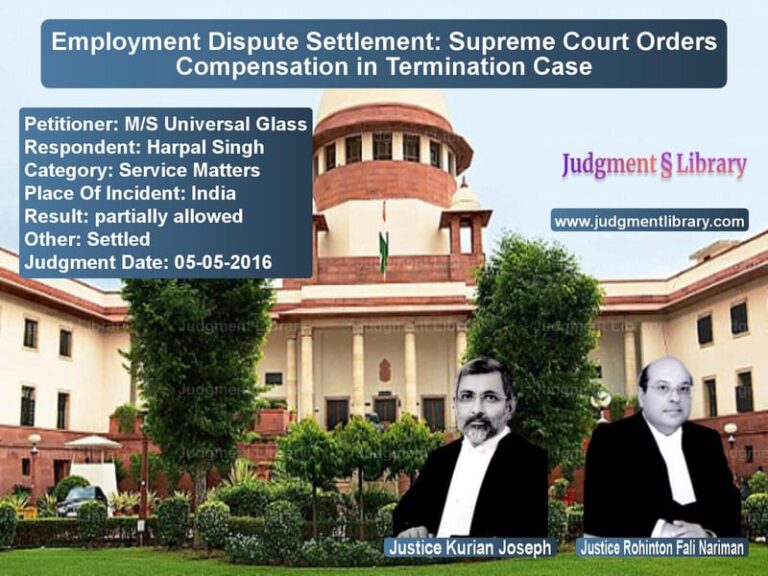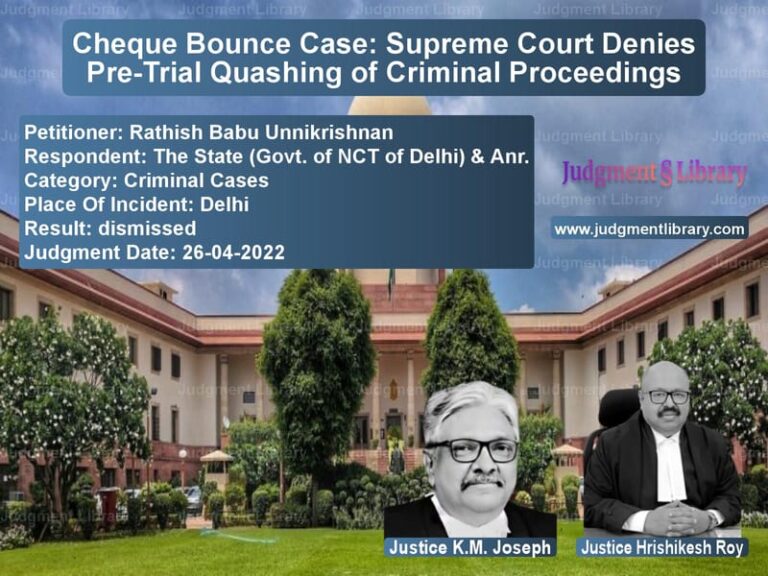Murder or Culpable Homicide? Supreme Court Upholds Conviction in Domestic Violence Case
The case of Suraj Jagannath Jadhav vs. The State of Maharashtra highlights the legal distinction between murder and culpable homicide not amounting to murder under the Indian Penal Code (IPC). The Supreme Court had to determine whether the appellant’s actions fell under Section 302 (murder) or whether the case should be considered under Exception 4 to Section 300 IPC, thereby reducing the offense to Section 304 Part II IPC.
Background of the Case
The appellant, Suraj Jagannath Jadhav, was convicted by the Trial Court for the murder of his wife by setting her on fire after pouring kerosene on her. The incident occurred in a domestic setting, and the victim, who was pregnant at the time, succumbed to burn injuries. The conviction under Section 302 IPC was upheld by the High Court of Bombay.
The appellant challenged this decision before the Supreme Court, arguing that the act was not premeditated and occurred in the heat of the moment. He sought to have the conviction modified from Section 302 IPC (murder) to Section 304 Part II IPC (culpable homicide not amounting to murder).
Arguments by the Appellant
The appellant’s counsel argued that:
- There was no premeditation; the act occurred in the heat of the moment.
- The accused was under the influence of alcohol at the time of the incident.
- After the incident, the appellant attempted to save the deceased by pouring water on her.
- Based on the precedent set in Kalu Ram vs. State of Rajasthan (2000) 10 SCC 324, the act did not constitute murder but culpable homicide not amounting to murder.
Arguments by the State
The prosecution strongly opposed the appeal, arguing that:
- The accused had a clear intention to kill, as he not only poured kerosene on his wife but also threw a matchstick on her.
- The accused acted with full consciousness and was not in a highly inebriated state.
- After setting his wife on fire, the accused did not immediately try to save her; he only poured water on her after she had screamed for help.
- Considering the brutality of the act, the case fell squarely under Section 302 IPC.
Supreme Court’s Observations
The Supreme Court bench, comprising M. R. Shah and Ashok Bhushan, upheld the conviction under Section 302 IPC, rejecting the appellant’s argument that the case should fall under Exception 4 to Section 300 IPC.
The Court stated:
“The act of the accused falls under Section 300 fourthly. Every person of average intelligence would have the knowledge that pouring kerosene and setting a person on fire is so imminently dangerous that in all probability such an act would cause injuries leading to death.”
The Court further clarified that merely because the accused attempted to pour water on the victim after she was engulfed in flames, it could not be considered a mitigating factor.
Key Legal Precedents Considered
The Court analyzed several precedents to distinguish between murder and culpable homicide not amounting to murder:
1. Kalu Ram vs. State of Rajasthan (2000) 10 SCC 324
In this case, the accused, in a state of extreme intoxication, asked his wife to give him money for liquor. When she refused, he poured kerosene on her and handed her a matchbox to burn herself. When she didn’t light the match, he did. However, realizing the consequences, he immediately tried to douse the flames. The Supreme Court held that the act was not intentional and modified the conviction to Section 304 Part II IPC.
2. Bhagwan Tukaram Dange vs. State of Maharashtra (2014) 4 SCC 270
In this case, the accused poured kerosene on his wife and set her on fire. He later claimed he was intoxicated and had no intention to kill. The Supreme Court ruled that voluntary intoxication is not a mitigating factor and upheld the conviction under Section 302 IPC.
3. Santosh vs. State of Maharashtra (2015) 7 SCC 641
Here, the accused set his wife on fire but later attempted to extinguish the flames. The Supreme Court ruled that once an individual performs an act that is imminently dangerous and likely to result in death, the offense qualifies as murder under Section 302 IPC.
Final Verdict
The Supreme Court concluded that the appellant had a clear intention to kill his wife and that his actions were deliberate and well-thought-out. The Court emphasized:
“The act of pouring kerosene and setting the victim on fire is one continuous act, and the accused cannot claim to have lacked intent simply because he later attempted to pour water on her.”
The Supreme Court upheld the conviction under Section 302 IPC and dismissed the appeal.
Implications of the Judgment
This judgment reinforces the principle that the nature of the act and its consequences determine the classification of the offense. Key takeaways include:
- Premeditation is not always necessary for a murder conviction. If an act is so imminently dangerous that death is a probable outcome, the accused cannot claim lack of intent.
- Intoxication is not a defense. Unless it is proven that the accused was in a highly inebriated state to the extent that he lost control of his actions, voluntary intoxication does not reduce criminal liability.
- Post-crime conduct does not absolve the accused. Pouring water on the victim after setting her ablaze does not negate the original intent behind the crime.
Conclusion
The Supreme Court’s ruling in Suraj Jagannath Jadhav vs. The State of Maharashtra underscores the gravity of domestic violence and the strict legal consequences of such heinous acts. The judgment clarifies that acts of extreme violence, even if committed on the spur of the moment, are not excusable under Exception 4 to Section 300 IPC. By upholding the conviction under Section 302 IPC, the Court has reinforced the necessity of stringent punishment for domestic crimes that result in the loss of life.
Petitioner Name: Suraj Jagannath Jadhav.Respondent Name: The State of Maharashtra.Judgment By: Justice M. R. Shah, Justice Ashok Bhushan.Place Of Incident: Maharashtra.Judgment Date: 13-12-2019.
Don’t miss out on the full details! Download the complete judgment in PDF format below and gain valuable insights instantly!
Download Judgment: Suraj Jagannath Jadh vs The State of Maharas Supreme Court of India Judgment Dated 13-12-2019.pdf
Direct Downlaod Judgment: Direct downlaod this Judgment
See all petitions in Murder Cases
See all petitions in Domestic Violence
See all petitions in Judgment by Mukeshkumar Rasikbhai Shah
See all petitions in Judgment by Ashok Bhushan
See all petitions in dismissed
See all petitions in supreme court of India judgments December 2019
See all petitions in 2019 judgments
See all posts in Criminal Cases Category
See all allowed petitions in Criminal Cases Category
See all Dismissed petitions in Criminal Cases Category
See all partially allowed petitions in Criminal Cases Category







